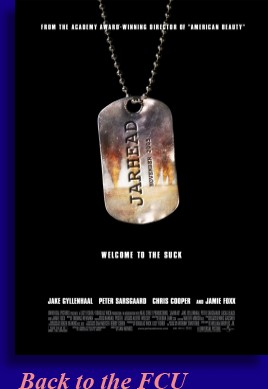

Reviewed by
Bud Carlson

It’s
interesting how war movies have changed over the decades and depending
on the war being discussed. World Wars I and II were covered and
discussed with soldiers and airmen as heroes. But when films about Vietnam began to emerge in the 1970’s, that all changed. The perceived unrighteousness of that war rubbed
off on the young men fighting in it, and the veterans who were screwed
up by it were vilified to a large extent. Hollywood seemed to be saying
that at least those soldiers who were scarred in WWII had been fighting for a just cause. The
Gulf War of 1990 was neither lengthy nor devastating enough to inspire
films the way Vietnam did, and it came at a time when an attitude of
detachment was crossing the nation. As a result, we see films like Three Kings and now Jarhead.
Jarhead is a humor-tinged yet haunting drama that examines the experiences and the psychology of a Gulf War veteran. The movie is based on LCpl. Anthony Swofford’s autobiography detailing his stint in the Gulf. Swofford (played by Jake Gyllenhaal)
is a directionless and unmotivated 20-year-old from a broken home, who
joins the Marines in 1989 because he says he has nothing else to do
with his life. He is recruited to join an elite team of snipers, led by
Staff Sgt. Siek (Jamie Foxx) as a rowdy band of brothers who participate in the usual testosterone-driven foolishness that young men do, while they learn how to shoot and fight.
When Saddam invades Kuwait and the troops are sent to the Middle East, Swofford and his fellow soldiers arrive eager to fight, driven by equal parts testosterone and patriotism. The soldiers are whooped up into a frenzy by Lt. Col. Kazinski (Chris Cooper), who


rallies them with talk of kicking some Iraqi-ass. These are men who, in one scene, watch Apocolypse Now
the way college students in Harvard Square watch “Rocky Horror
Picture Show”, reciting the lines and singing the songs. Another
scene shows a helicopter flying over their heads, blasting music by The
Doors, Swofford says bitterly, “That’s Vietnam music. Can’t we get our own fucking music?” Well, the answer is no. Even when Desert Storm begins, after 175 days of idling (training, sitting around, pleasuring themselves), it’s quickly over, and the ground troops like Swofford’s crew play a relatively small part. They’ve put for a lot of effort without actually accomplishing much.
But the real take-home from the movie is that, even though Swofford and his sniper-partner Troy (Peter Sarsgaard)
never really find themselves too much in harm’s way, they emerge
from the experience with a psyche just as scarred as if they would have
seen heavy action. Swofford sees
pointlessness and futility at nearly ever turn, always training but
never getting the experience of putting that training to work. He warms
the bench for the whole game, but winds up bruised as if he had played. Interestingly, the movie has almost no scenes from Swofford’s post-war life. Yet somehow we know that he’ll be a changed man when he gets back home.
